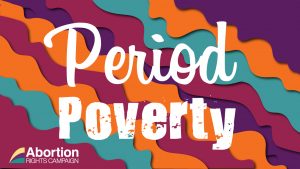
Roughly half of the world’s female population is of reproductive age. Periods should be seen as a normal bodily function and should be treated respectfully. Yet, periods continue to be stigmatised, while also placing unfair financial burdens on people who menstruate. Period poverty, or the lack of access to sanitary products, menstrual hygiene education, toilets, and/or proper washing facilities, afflicts many women and girls around the world – even here in Ireland. A study by Plan International found that nearly half of teenage girls in Ireland struggle to afford sanitary towels and tampons, even though many period products are not taxed in Ireland, unlike most other nations. Poor menstrual hygiene can pose physical health risks, increases the likelihood of reproductive and urinary tract infections, and undermines people’s dignity and self-confidence.
ARC works to lift the stigma and silence surrounding abortion and reproductive healthcare choices, including periods. We believe that menstrual education should be fully integrated into relationships and sexuality education for all students. Keeping with ARC’s commitment to free, safe, legal and local abortion care, we also believe that period products should be made freely available in places which are easily accessible, especially for those who can least afford to buy them.
Barriers to Period Products
Economic barriers combined with stigma can prevent people from accessing the essential products they need during their period. In Ireland, tampons can cost anywhere from €1.50 to €6 a pack, and sanitary towels range between €2 to €6 a pack. Reusable menstrual cups cost about €24 to €30, plus 23% VAT, and are a more economical option for those who can afford the upfront cost and are interested in using this type of product. Many individuals (nearly 70 percent of young women surveyed in Ireland) also need pain relief medication during their period. On average, people have 12-13 periods a year, resulting in an estimated annual cost of €132 for period products. Almost 10 percent of the young Irish women surveyed by Plan International reported that they resorted to a “less suitable sanitary product” because of the high cost barriers.
The price and availability of period products disproportionately impact the people who are least able to afford them (e.g. those living in poverty, with disabilities and with unresolved immigration status). For homeless individuals who do not have the funds for basic necessities such as housing, food, or medicines, the expense of period products can place them out of reach. Without access to a tampon or sanitary pad, many resort to using a wad of toilet paper, which is largely ineffective and can cause health risks, or simply bleeding through their clothes, which they cannot easily wash because of their precarious living situation. Direct Provision centres in Ireland also do not provide asylum-seekers with sanitary products, which can be difficult to afford with only the meagre weekly allowance provided. Period products are essential items that the State should provide.
Ways to Take Action:
Talk to Your Elected Officials about Period Poverty
Period poverty has gained traction in other countries as a policy issue. For example, Scotland recently became the first nation in the world to make tampons and pads free for all school, college, and university students. Shortly thereafter, the UK Parliament announced that it would also provide free period products in secondary schools and colleges in England.
Irish politicians are also starting to take notice of this important topic.
- In September 2018, Dublin City Council announced it will provide free sanitary products in its buildings, such as community centres, swimming pools and libraries, but this has yet to go into effect.
- In March 2019, a motion tabled by the Oireachtas Women’s Parliamentary Caucus called for the provision of sanitary products and menstrual information in all public buildings, including schools, universities, Direct Provision centres, refuges, Garda stations, hospitals and prisons. This motion was passed by the Dáil and the Seanad, but has been deferred to the National Strategy for Women and Girls (NSWG) Strategy Committee, which is led by the Department of Justice and Equality and includes representation from across Government, the Health Service Executive (HSE), the National Women’s Council of Ireland and a number of NGOs.
- In October 2019, the Minister for Health established a Committee to address period poverty.
While we welcome these initial steps, we have yet to see any concrete changes in our communities. Contact your city councillors and TDs today to ask when our officials will turn their commitment to providing free period products in public buildings into action.
Donate Period Products to Homeless Period Ireland
After you’ve contacted your elected officials, you can continue to take action by donating period products to local charities working on this issue. While many of us take tampons, pads, and period products for granted, the provision of sanitary products to homeless individuals and other marginalised groups is a simple, yet powerful, way of re-affirming dignity and prioritising health. The volunteers of Homeless Period Ireland establish donation/collection points for sanitary products throughout Ireland and distribute the donated items to those living in homeless accommodation and Direct Provision centres, among others. You can view the list of donation drop-off points across Ireland here.
Period poverty in Ireland should be addressed at a minimum by providing period products in public buildings and to those who need free products the most, such as young people, refugees, and asylum-seekers. Our elected representatives need to continue to advance efforts to reduce the stigma and shame associated with menstruation through education and awareness efforts for all students in Irish schools.

